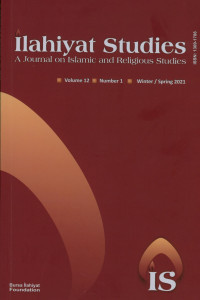The Reform Debate: al-Marzūqī and al-Būṭī on the Renewal of Uṣūl al-fiqh
The renewal of Islamic legal hermeneutics has been a subject of controversy since the 19th century. Muslim jurists and thinkers disagree on the extent to which the sources and the procedures of istidlāl, legal reasoning, embodied in Islamic legal hermeneutics, uṣūl al-fiqh, should be restructured. This study deals with one of the most recent discussions on this question, which opposed the Tunisian A. al-Marzūqī and the Syrian M. S. Ramaḍān al-Būṭī. The answers of the two debaters are interesting in more than a case. On the one side, al-Marzūqī argued for an open and collective legal hermeneutics that would function as a public reasoning. On the other side, al-Būṭī adopts a conventional line of thought, defending the methodological self-sufficiency of Islamic law. This paper will investigate the premises, the conclusions, and the counter-arguments of each of the debaters. Besides, light will be shed on the new elements that emerged in the dispute with regard to legal reform in Islamic law.
The Reform Debate: al-Marzūqī and al-Būṭī on the Renewal of Uṣūl al-fiqh
The renewal of Islamic legal hermeneutics has been a subject of controversy since the 19th century. Muslim jurists and thinkers disagree on the extent to which the sources and the procedures of istidlāl, legal reasoning, embodied in Islamic legal hermeneutics, uṣūl al-fiqh, should be restructured. This study deals with one of the most recent discussions on this question, which opposed the Tunisian A. al-Marzūqī and the Syrian M. S. Ramaḍān al-Būṭī. The answers of the two debaters are interesting in more than a case. On the one side, al-Marzūqī argued for an open and collective legal hermeneutics that would function as a public reasoning. On the other side, al-Būṭī adopts a conventional line of thought, defending the methodological self-sufficiency of Islamic law. This paper will investigate the premises, the conclusions, and the counter-arguments of each of the debaters. Besides, light will be shed on the new elements that emerged in the dispute with regard to legal reform in Islamic law.
Keywords:
Reform, al-Marzūqī, al-Būṭī, renewal, uṣūl al-fiqh, Islamic legal hermeneutics, Reform, al-Marzūqī, al-Būṭī, renewal, uṣūl al-fiqh Islamic legal hermeneutics,
___
- ʿAbd al-Karīm, ʿAbd al-Salām, al-Tajdīd wa-l-mujaddidūn fī uṣūl al-fiqh (Cairo: al-Maktaba al-Islāmiyya, 2003).
- Arkoun, Mohammad, Pour une Critique de la Raison Islamique (Paris: Maisonneuve et Larose, 1984).
- ʿAtrabī, Muḥammad Fatḥī Muḥammad, al-Tajdīd fī ʿilm uṣūl al-fiqh al-Sunnī fī l-ʿaṣr al-ḥadīth: bayna l-naẓariyya wa-l-taṭbīq (al-Iskandariyya: Dār al-Maṭbūʿāt al-Jāmiʿiyya, 2012).
- Balājī, ʿAbd al-Salām, Taṭawwur ʿilm uṣūl al-fiqh wa-tajadduduhū (al-Manṣūra: Dār al-Wafāʾ, 2007).
- Balḥājj, ʿAbd al-Ṣamad, "al-Taṣawwuf wa-l-Ikhwān al-Muslimūn fī Sūriyya: al-Būṭī wa-madrasatuhū," al-Misbār 66 (al-Islām al-nāʾim: al-taṣawwuf fī bilād al-Shām) (2012), 283-304.
- al-Būṭī, Muḥammad Saʿīd Ramaḍān, Ḍawābiṭ al-maṣlaḥa fī l-sharīʿa al-Islāmiyya (Beirut: Muʾassasat al-Risāla, 1973).
- Christmann, Andreas, "Islamic Scholar and Religious Leader: a Portrait of Shaykh Muḥammad Saʿīd Ramaḍān al-Būṭī," Islam and Christian-Muslim Relations 9/2 (1998), 149-169, https://doi.org/10.1080/09596419808721146
- al-Dasūqī, Muḥammad, al-Tajdīd fī l-fiqh al-Islāmī (Beirut: Dār al-Madār al-Islāmī, 2001).
- al-Dasūqī, Muḥammad, Naẓra naqdiyya fī l-dirāsāt al-uṣūliyya al-muʿāṣira (Beirut: Dār al-Madār al-Islāmī, 2004).
- al-Ghazālī, Muḥammad, al-Sunna al-nabawiyya bayna ahl al-fiqh wa-ahl al-ḥadīth (Cairo: Dār al-Shurūq, 1989).
- Ḥanafī, Ḥasan, Min al-naṣṣ ilā l-wāqiʿ: muḥāwala li-iʿādat bināʾ uṣūl al-fiqh (Cairo: Markaz al-Kitāb li-l-Nashr, 2004).
- Houot, Sandra, "De la religion à l'éthique. Esquisse d'une médiation con-temporaine," Revue du monde musulman et de la Méditerranée 85-86 (1999), 31-46, https://doi.org/10.3406/remmm.1999.2635
- Houot, Sandra, "Culture religieuse et média électronique: le cas du cheikh Muḥammad al-Būṭī," Maghreb-Machrek 178 (2003), 75-87.
- Johnston, David, "A Turn in the Epistemology and Hermeneutics of Twentieth Century uṣūl al-fiqh," Islamic Law and Society 11 (2004), 233-282, https://doi.org/10.1163/156851904323178764
- Johnston, David, "Maqāṣid al-sharīʿa: Epistemology and Hermeneutics of Muslim Theologies of Human Rights," Welt des Islams 47 (2007), 149-187, https://doi.org/10.1163/157006007781569936
- Kerr, Malcolm Hooper, Islamic Reform: The Political and Legal Theories of Muḥammad ʿAbduh and Rashīd Riḍā (Berkeley: University of California Press, 1966).
- Kersten, Carool, "Bold Transmutations: Rereading Hasan Hanafi's Early Writings on fiqh," Comparative Islamic Studies 3 (2008), 22-38, https://doi.org/10.1558/cis.v3i1.22
- Krawietz, Birgit, Hierarchie der Rechtsquellen im tradierten sunnitischen Islam (Berlin: Duncker & Humblot, 2002).
- al-Marzūqī, Abū Yaʿrub & al-Būṭī, Muḥammad Saʿīd Ramaḍān, Ishkāliyyat tajdīd uṣūl al-fiqh (Damascus: Dār al-Fikr, 2006).
- al-Marzūqī, Abū Yaʿrub, Iṣlāḥ al-ʿaql fī l-falsafa al-ʿArabiyya (Beirut: Markaz Dirāsāt al-Waḥda al-ʿArabiyya, 1996).
- al-Marzūqī, Abū Yaʿrub, Waḥdat al-fikrayn al-dīnī wa-l-falsafī (Damascus: Dār al-Fikr, 2011).
- Opwis, Felicitas, "Changes in Modern Islamic Legal Theory: Reform or Reformation?" in Michaelle Browers and Charles Kurzman (eds.), An Islamic Reformation? (Lanham, MD: Lexington Books, 2004), 28-53.
- Rahman, Fazlur, Prophecy in Islam: Philosophy and Orthodoxy (Chicago: University of Chicago Press, 1958).
- Rahman, Fazlur, Islam (London: Weidenfeld & Nicolson, 1966).
- Rahman, Fazlur, Islamic Methodology in History (Islamabad: Islamic Research Institute, 1995).
- al-Turābī, Ḥasan, Tajdīd uṣūl al-fiqh al-Islāmī (Beirut: Dār al-Jīl, 1980).
- ISSN: 1309-1786
- Başlangıç: 2010
- Yayıncı: Bursa İlahiyat Vakfı
Sayıdaki Diğer Makaleler
Der Eine und das Andere : Beobachtungen an islamischen häresiographischen Texten, by Josef van Ess
Religion in Modern Islamic Discourse, by Abdulkader Tayob
The Reform Debate: al-Marzūqī and al-Būṭī on the Renewal of Uṣūl al-fiqh
Prophetic Niche in the Virtous City: The Concept of Ḥikmah in Early Islamic Thought, by Hikmet Yaman
The Essentials of Ibāḍī Islam, by Valeria J. Hoffman
Humor in Early Islam, by Franz Rosenthal, with an introduction by Geert Jan van Gelder
